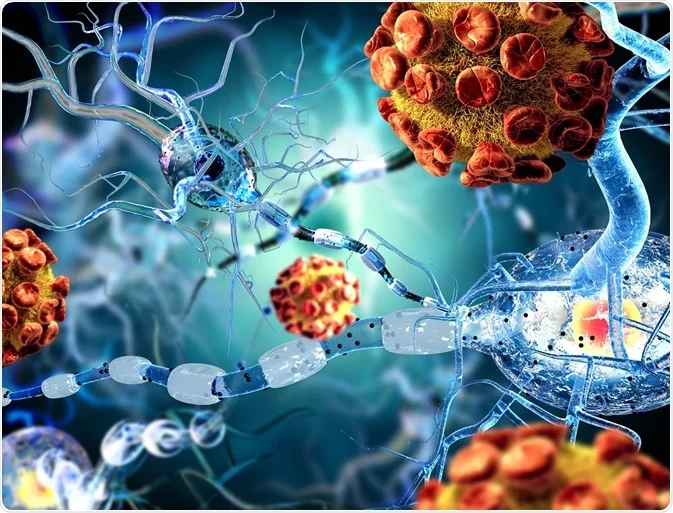Introduction to Autoimmune Encephalitis
Autoimmune encephalitis is a complex medical condition where the immune system mistakenly attacks healthy brain cells, leading to inflammation. This condition often results in various neurological symptoms, making it crucial to delve into the intricacies of its causes, symptoms, diagnosis, and treatment.
Understanding the Immune System’s Role
The Basics of Autoimmune Diseases
To comprehend autoimmune encephalitis, it’s essential to grasp the fundamentals of autoimmune diseases. These conditions occur when the immune system, designed to protect the body, turns against it, attacking normal cells. Autoimmune encephalitis specifically targets the brain, causing a range of issues.
Immune System Malfunctions in Autoimmune Encephalitis
In this section, we’ll explore how the immune system malfunctions in autoimmune encephalitis, triggering an inflammatory response that affects the brain’s normal functioning.
Identifying Symptoms and Early Signs
Cognitive Impairment
One of the hallmark signs of autoimmune encephalitis is cognitive impairment. Memory loss, confusion, and difficulty concentrating are common, affecting daily life significantly.
Behavioral Changes
Patients may experience sudden behavioral changes, including mood swings, aggression, or personality alterations. These changes can be challenging for both the individual and their loved ones.

Neurological Symptoms
Neurological symptoms such as seizures, coordination problems, and speech difficulties may manifest, emphasizing the need for early detection and intervention.
Diagnosing Autoimmune Encephalitis
Medical History and Physical Examination
Physicians often begin the diagnostic process by taking a detailed medical history and conducting a thorough physical examination. These steps help identify patterns of symptoms and potential triggers.
Laboratory Tests
Blood tests and cerebrospinal fluid analysis are vital in detecting specific antibodies and markers associated with autoimmune encephalitis, aiding in accurate diagnosis.
Imaging Studies
Advanced imaging studies, such as MRI and PET scans, provide crucial insights into the brain’s structure and function, aiding in the identification of inflammation or abnormalities.
Treatment Approaches and Challenges
Immune Therapies
Immunotherapy, a cornerstone in treating autoimmune encephalitis, aims to modulate the immune system’s response. Intravenous immunoglobulin (IVIG) and corticosteroids are commonly employed to suppress inflammation.
Medications for Symptom Management
While immunotherapy addresses the root cause, medications such as anticonvulsants and anti-psychotics are often prescribed to manage specific symptoms, enhancing overall patient well-being.
Potential Side Effects and Risks
It’s crucial to acknowledge the potential side effects and risks associated with autoimmune encephalitis treatments. Balancing the benefits and risks is a critical aspect of patient care.
Impact on Daily Life: Coping and Support
Lifestyle Adjustments
Living with autoimmune encephalitis necessitates lifestyle adjustments. Patients may need support in adapting daily routines to accommodate cognitive and physical challenges.
Emotional Well-being
The emotional toll of autoimmune encephalitis is significant. Addressing mental health aspects, such as anxiety and depression, is integral to holistic patient care.
Support Groups and Resources
Connecting with support groups and utilizing available resources can provide valuable insights and emotional support, fostering a sense of community among individuals facing similar challenges.
Recent Research and Advancements
Breakthroughs in Understanding Autoimmune Encephalitis
Ongoing research has yielded breakthroughs in understanding autoimmune encephalitis, shedding light on new potential therapeutic targets and diagnostic approaches.
Ongoing Clinical Trials
Participation in clinical trials is an avenue for patients to access cutting-edge treatments and contribute to the advancement of medical knowledge regarding autoimmune encephalitis.
Preventing Autoimmune Encephalitis
General Immune Health
Maintaining overall immune health through a balanced diet, regular exercise, and adequate sleep can contribute to reducing the risk of autoimmune encephalitis.
Vaccination and Immunization
Ensuring up-to-date vaccinations and immunizations is crucial in preventing infections that could potentially trigger autoimmune responses leading to encephalitis.
Living with Autoimmune Encephalitis: Patient Stories
Personal Experiences
In this section, real-life experiences of individuals living with autoimmune encephalitis will be shared, providing insights into the challenges they face and how they navigate daily life.
Overcoming Challenges
Highlighting stories of resilience and strategies employed by patients to overcome challenges, emphasizing the importance of a positive mindset and a strong support system.
The Future of Autoimmune Encephalitis Treatment
Promising Developments
Explore emerging treatments and technologies that show promise in revolutionizing the landscape of autoimmune encephalitis treatment.
Collaborative Efforts in Research
Highlighting the significance of collaborative efforts between researchers, healthcare professionals, and patients in driving advancements in autoimmune encephalitis research and treatment.
Conclusion
In conclusion, autoimmune encephalitis is a complex condition that requires a comprehensive understanding of its various facets. From identification of symptoms to advancements in treatment, addressing the challenges posed by this autoimmune disorder necessitates a holistic and collaborative approach.
FAQs
- Is autoimmune encephalitis a rare condition?
- Autoimmune encephalitis is considered relatively rare, but awareness and diagnosis have increased in recent years.
- Can autoimmune encephalitis be cured completely?
- While some cases may fully recover with prompt and effective treatment, others may require ongoing management of symptoms.
- What role does genetics play in autoimmune encephalitis?
- There is evidence suggesting a genetic predisposition to autoimmune encephalitis, but environmental factors also play a significant role.
- Are there specific risk factors for developing autoimmune encephalitis?
- Certain infections, tumors, or prior autoimmune conditions may increase the risk of developing autoimmune encephalitis.
- How can family and friends support someone with autoimmune encephalitis?
- Providing emotional support, helping with daily tasks, and staying informed about the condition can be immensely supportive.
